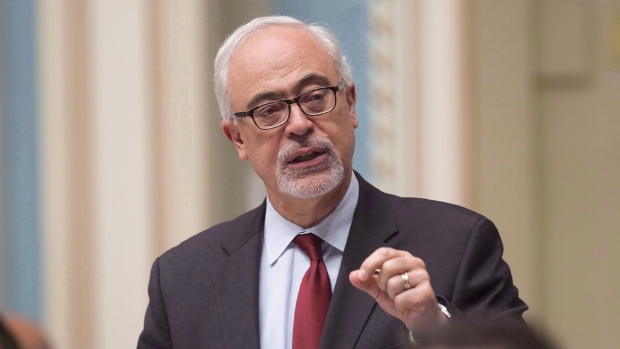Mar 5, 2019
'Real risk' SNC moves to U.K., warns ex-Quebec finance minister

SNC-Lavalin Group Inc. (SNC.TO), the engineering giant at the centre of a political maelstrom engulfing the federal government, is an “important and strategic” part of the Canadian economy that would be a “real loss” for the country if the firm decides to move its head office overseas, a former Quebec finance minister said.
“The head office of a global multinational can play an important role in the fabric of a metropolitan area,” said Carlos Leitao, who served as Quebec’s finance minister under the previous Liberal government, as well as the former chief economist for Laurentian Bank Securities, in an interview with BNN Bloomberg Tuesday. “The real risk is that SNC will change its head office from Montreal to London. I think that would be a real loss for the Canadian economy if that were to happen.”
Former justice minister and attorney general Jody Wilson-Raybould testified last week before the House of Commons justice committee that government officials said SNC-Lavalin officials were likely to move the company’s head office to the U.K. if the federal government wasn’t able to negotiate an out-of-court settlement over a contemptuous corruption case and avoid a criminal prosecution.
Prime Minister Justin Trudeau and his officials allegedly leaned on Wilson-Raybould to reverse a decision by the director of public prosecutions to proceed with a criminal trial of SNC-Lavalin on charges of bribery and corruption related to contracts in Libya. Instead, they allegedly wanted her to order negotiation of a remediation agreement with the company that would have levied stiff financial penalties but would have removed the prospect of a criminal conviction that could cripple the company financially and hurt innocent employees, pensioners and suppliers.
- SNC sues former CEO Duhaime for millions over hospital bribery scandal
- Trudeau lauds Philpott after minister resigns over SNC affair
- Women are abandoning Trudeau’s team over the SNC-Lavalin scandal
RELATED
Leitao said SNC-Lavalin wasn’t looking for a “free pass” in regards to the criminal charges laid against the company, but rather sought a deferred prosecution agreement, which would allow it to continue operating and be able to apply for procurement contracts in the country.
“If the federal government decides that’s not possible, fine, but then what we would like to know in Quebec, why? Why didn’t the former attorney general consider SNC eligible for such an agreement,” Leitao asked, noting that the upcoming testimony from Trudeau’s former principal secretary Gerald Butts on Wednesday may shed some light on why a settlement didn’t happen.
Leitao added he supports the federal government’s work on the SNC file and ultimately concluded that it’s in the best interest for the Canadian economy if a solution for the company would be found.
“SNC, as a company today, is not the same company it was 10 years ago,” he said.
The company is a pillar of Montreal's business community, employs some 9,000 people across Canada and is a major player in infrastructure projects both inside and outside Canada.
The decline of SNC-Lavalin’s shares over the six weeks makes the company “vulnerable” to a hostile takeover bid, Leitao said. Shares of the company have declined by about 26 per cent since it disclosed a “serious problem” with a Latin American mining contract and took a $1.24 billion charge related to its oil and gas business in Saudi Arabia.
“Since it doesn’t have one controlling shareholder, one such scenario is possible,” Leitao said.
With files from The Canadian Press


